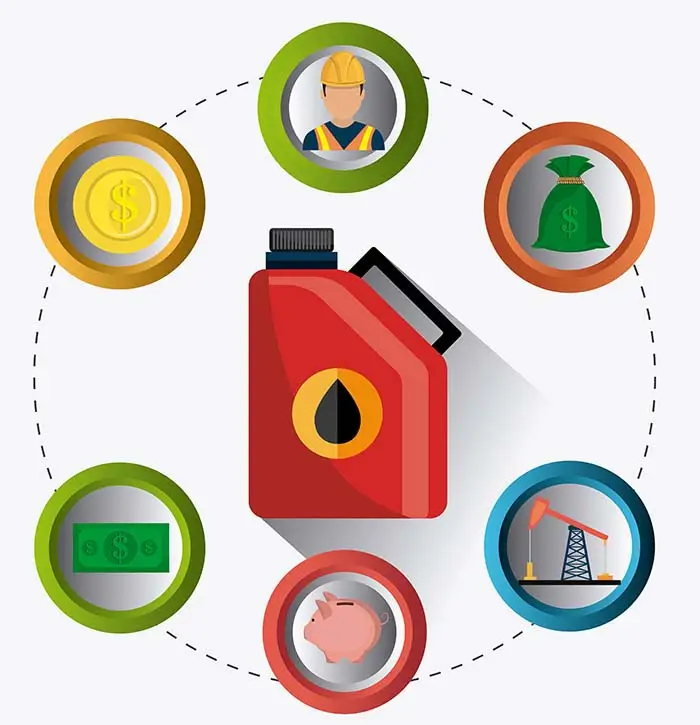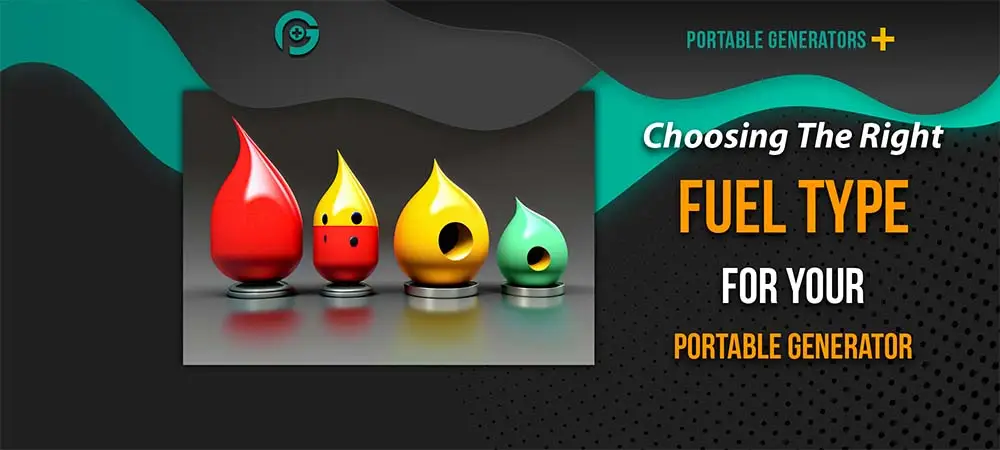Choosing The Right Fuel Type For Your Portable Generator - Quick Answer...
Choosing the right fuel for a portable generator depends on fuel availability, cost, and the generator’s specifications. Consider gasoline for ease of access, propane for environmental friendliness and long shelf life, or diesel for efficiency and longer-term use.
The choice should align with your specific needs, budget, and the generator’s design.
Intro
Are you considering purchasing a portable generator but feeling overwhelmed by the variety of fuel options available? In this article, you will find guidance on selecting the right fuel type for your portable generator.
Whether you prioritize convenience, efficiency, or environmental impact, we will explore the pros and cons of different fuel options, allowing you to make an informed decision. Say goodbye to confusion and say hello to finding the perfect fuel for your portable generator. Let’s get started!
Cost
Initial Cost
When considering the cost of fuel for your portable generator, it’s essential to factor in the initial cost of purchasing the generator itself. Portable generators come in a wide range of prices, depending on the brand, size, and features.
While some models may be more expensive initially, they often come with additional benefits, such as higher efficiency or more power output. However, it’s important to find a balance between cost and functionality to ensure you get the best value for your money.
Operating Cost
Operating costs are another crucial aspect to consider when selecting the fuel type for your portable generator. Different fuel options have varying costs per gallon or liter, so it’s essential to compare prices and calculate the potential running expenses.
While some fuel types may be cheaper initially, they might not offer the same level of efficiency as others. Understanding the operating cost of each fuel type will help you make an informed decision and avoid any surprises down the road.
Availability
Ease of Access
The ease of access to fuel is a critical factor to consider when choosing the right fuel type for your portable generator. Certain fuel types, such as gasoline, can be found almost anywhere, including gas stations, convenience stores, and even your local grocery store.
On the other hand, alternative fuel options like propane or diesel may not be as readily available in all areas. It’s vital to assess the accessibility of different fuel types in your location to ensure you have a convenient and reliable source of fuel for your portable generator.

Fuel Stations
In addition to the ease of access, the proximity and availability of fuel stations that carry your chosen fuel type are also essential. Gasoline-powered generators have the advantage of a vast network of fuel stations where you can easily refill your portable generator’s tank.
If, however, you opt for a fuel type that is less commonly used, such as diesel or propane, you may need to research and locate nearby fuel stations that carry the specific fuel you require. Planning for such convenience will help you avoid any inconveniences or delays when refueling your generator.
Storage
Safety
When it comes to fuel storage, safety should always be a top priority. Proper storage of fuel is critical to avoid accidents and ensure the well-being of yourself and others. Some fuel types, like gasoline, require special precautions due to their flammability.
Storing gasoline in approved containers and in a well-ventilated area away from potential ignition sources is important. On the other hand, propane and diesel are generally considered safer fuels to store and handle. Understanding the safety requirements and regulations for each fuel type will help you make an informed decision and prioritize the well-being of everyone around you.
Shelf Life
The shelf life of fuel is a crucial consideration, especially if you plan to store it for an extended period or use it infrequently. Gasoline has a relatively short shelf life, typically around 6-12 months, depending on certain factors such as additives and storage conditions.
This means you may need to periodically rotate the fuel and ensure it remains fresh. Diesel fuel, on the other hand, has a longer shelf life of around 12-24 months. Propane, being stored in pressurized tanks, has an indefinite shelf life. Understanding the shelf life of each fuel type will help you plan accordingly and avoid any potential fuel degradation.
Environmental Impact
Emissions
The environmental impact of your portable generator and its fuel type is a significant consideration, particularly for those who prioritize sustainability. Gasoline and diesel fuel generators tend to emit greenhouse gases, contributing to air pollution and climate change.
On the other hand, propane-powered generators produce fewer emissions and are considered cleaner-burning. Additionally, there has been a growing focus on renewable fuel options for portable generators, such as biodiesel or solar power. These renewable options offer reduced emissions and have a significantly lower impact on the environment. Taking into account the emissions of different fuel types will help you make an environmentally conscious choice.
Renewable Options
As the world becomes more conscious of environmental concerns, seeking renewable fuel options for portable generators has become increasingly popular. Biofuels, made from organic matter such as plants or vegetable oils, provide an alternative to traditional fossil fuels.
Biodiesel, for example, can be used in diesel-powered generators and offers lower emissions compared to regular diesel fuel. Solar power is another renewable option gaining traction in the portable generator market. Solar generators harness the energy of the sun to generate power and are emission-free. Considering renewable options aligns with sustainability goals and supports efforts to reduce the carbon footprint.
Convenience

Portability
One of the key advantages of portable generators is their ability to be easily moved and transported. When considering the convenience of fuel types, it’s essential to choose one that is compatible with the portability of your generator.
Gasoline-powered generators are often the most portable, as gasoline is widely available and can be easily carried in containers.
Stored in pressurized tanks, propane can also offer portability, although the tanks may add weight.
Alternatively, diesel generators may be less portable due to the bulkiness and weight of diesel fuel. Assessing the portability factor will help you determine the most convenient fuel type for your specific needs.
Refueling Frequency
Another aspect of convenience is the refueling frequency of your portable generator. If you require extended periods of continuous power, you may want to consider a fuel type that allows for longer runtimes before requiring a refill.
- Gasoline-powered generators, though easy to find and refill, may need more frequent refueling due to their relatively lower fuel efficiency.
- Propane offers longer runtimes per tank, reducing the need for frequent refills.
- Diesel fuel also provides better fuel efficiency, thus allowing for more extended periods between refueling.
Understanding the refueling frequency will help you plan ahead and avoid interruptions when using your portable generator.
Generator Type
Compatibility
When selecting the fuel type for your portable generator, it’s vital to ensure compatibility between the generator and the fuel source. Different generators are designed to run on specific fuel types, and using the wrong fuel can damage the generator or pose safety hazards.
Gasoline-powered generators are the most common and versatile, as they can accommodate various gasoline blends. Diesel generators, on the other hand, require diesel fuel specifically formulated for diesel engines.
Propane-powered generators may have specialized carburetors or fuel systems to handle the differences in fuel properties. Checking the compatibility ensures optimal performance and longevity of your portable generator.
Manufacturer Recommendation
To further guarantee the best performance and longevity of your portable generator, it’s important to consider the manufacturer’s recommendations regarding fuel types.
Manufacturers thoroughly test and validate their generators with specific fuel types, and deviating from their recommendations may void warranties or compromise safety. Manufacturer recommendations often take into account factors such as engine design, emissions, and fuel efficiency.
By following the manufacturer’s guidance, you can have peace of mind knowing that your portable generator is optimized for the chosen fuel type and will operate reliably for years to come.
Performance
Power Output
The power output of a portable generator is a crucial performance metric and directly impacts the devices and appliances it can support.
Different fuel types may offer varying power outputs, affecting the generator’s overall capability.
- Gasoline-powered generators are often known for providing higher power outputs, making them suitable for larger loads or heavy-duty applications.
- Diesel generators also offer substantial power outputs, but they may be slightly lower compared to gasoline generators.
- Propane generators generally have the lowest power outputs among the three fuel types but are still capable of meeting the needs of most standard applications.
- Understanding the power output will help you choose a fuel type that aligns with your specific power requirements.
Efficiency
Efficiency is another key performance factor, as it directly relates to the fuel consumption and runtime of your portable generator.
Gasoline generators are typically less efficient compared to their diesel or propane counterparts. This means that gasoline generators may consume more fuel for the same amount of generated electricity, resulting in shorter runtimes and more frequent refueling.
Diesel and propane generators, on the other hand, offer better efficiency, allowing for longer runtimes and reduced fuel consumption. Evaluating the efficiency of each fuel type will help you determine the most suitable option for your intended usage and maximize the generator’s performance.
Fuel Stability
Carburetor Maintenance
Fuel stability is an important consideration, especially if your portable generator may sit idle for extended periods. Gasoline, being prone to deterioration, can cause carburetor issues if left unused for an extended time.
This deterioration leads to gum or varnish formation that can clog the carburetor and affect the generator’s performance. Propane, on the other hand, is known for its stability and does not degrade over time. Diesel fuel also exhibits better stability compared to gasoline.
Considering fuel stability is crucial for minimizing maintenance requirements and ensuring your portable generator operates smoothly when needed.
Fuel Quality
The quality of fuel you choose for your portable generator can significantly impact its performance and longevity. Gasoline quality varies based on octane rating and the presence of additives or ethanol blends.
Higher octane gasoline and ethanol-free options are generally recommended for better engine performance and reduced carbon deposits.
Diesel fuel quality also plays a vital role, as low-quality or contaminated diesel can result in clogged fuel filters or injector issues.
Propane, being stored in sealed pressurized tanks, is less susceptible to quality issues. Prioritizing fuel quality will help you avoid potential fuel-related problems and optimize your portable generator’s reliability.
Long-Term Use
Engine Lifespan
The lifespan of the engine in your portable generator is a crucial consideration, as it directly affects the long-term value and reliability of your investment. Different fuel types can have varying impacts on the engine’s lifespan.
Gasoline engines tend to have shorter lifespans compared to diesel or propane engines. Propane engines, in particular, are known for their longevity, thanks to the cleaner combustion and reduced carbon deposits.
Diesel engines also offer robust durability and can withstand heavy loads and continuous operation. Considering the engine lifespan will help you make an informed decision that aligns with your long-term usage and maintenance expectations.
Maintenance Requirements
Every portable generator requires regular maintenance to ensure optimal performance and longevity. However, different fuel types may have varying maintenance requirements.
Gasoline generators, for example, often necessitate more frequent maintenance due to the higher combustion byproducts and potential carburetor issues.
Diesel generators generally require less maintenance, thanks to the cleaner combustion and overall durability of diesel engines.
Propane generators typically have fewer maintenance requirements, as propane’s clean-burning properties minimize carbon deposits and extend the intervals between service. Evaluating the maintenance requirements will help you choose a fuel type that suits your maintenance capabilities and preferences.
Emergency Preparedness
Fuel Shelf Life
During emergencies or prolonged power outages, having a reliable source of fuel for your portable generator is crucial. Fuel shelf-life plays a significant role in such scenarios, as it determines how long you can store fuel before it becomes unusable.
Gasoline typically has a shorter shelf life compared to diesel or propane. This means you may need to rotate gasoline more frequently or consider fuel stabilizers to extend its usability.
Diesel fuel offers a longer shelf life, allowing for more prolonged storage without significant degradation.
Propane, stored in sealed tanks, has an indefinite shelf life, making it a reliable option for emergency preparedness. Considering fuel shelf life will help you plan and stock up on fuel accordingly.
Availability during Disasters

Availability of fuel during disasters or emergencies can be a critical challenge, as fuel stations may become inaccessible or experience shortages.
During natural disasters like hurricanes or earthquakes, prioritizing fuel types that are more readily available can be beneficial.
Gasoline, being widely used and available, often has a better chance of being supplied when needed urgently.
Diesel fuel, while less commonly used in small portable generators, may still be available to some extent due to its widespread use in commercial vehicles and equipment.
Propane, due to its lesser reliance on traditional fuel stations, can provide a reliable source of energy even during challenging times. Assessing the availability during disasters will help you select a fuel type that offers peace of mind and ensures your generator can keep providing power when it matters most.
Conclusion
In conclusion, choosing the right fuel type for your portable generator involves considering several crucial factors.
Assessing the initial and operating costs, availability, storage requirements, environmental impact, convenience, generator compatibility and performance, fuel stability, long-term use, and emergency preparedness will help you make an informed decision.
By carefully evaluating each aspect, you can select a fuel type that suits your specific needs, maximizes the generator’s performance and efficiency, and provides reliable power when you need it most.


